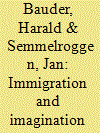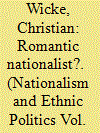| Srl | Item |
| 1 |
ID:
108673


|
|
|
|
|
| Publication |
2009.
|
| Summary/Abstract |
Immigration policy and debate can reveal how a nation imagines itself. This study examines the dialectic between immigration and German nationhood in the context of the parliamentary debates between 2002 and 2006. Contents and discourse analyses of transcripts of the Bundestag were supplemented with interviews with policymakers. Our interpretation of the data reveals two distinct narratives: that Muslim immigration is a threat to the democratic order of the German state; and that immigration constitutes a utility serving economical and social objectives. European Union regulations, party politics, and the nature of parliamentary speech also play a role in framing parliamentary discourse of immigration and nationhood.
|
|
|
|
|
|
|
|
|
|
|
|
|
|
|
|
| 2 |
ID:
121409


|
|
|
|
|
| Publication |
2013.
|
| Summary/Abstract |
This article analyzes the personal nationalism of Helmut Kohl, the so-called "Chancellor of Unity." The German politician acted as a (neo)romantic nationalist, who articulated his concept of nation in cultural and ethnic terms and as primarily detached from the idea of the nation-state. This kind of nationalism has been portrayed as something typically German and dangerous, as part of the nation's cultural Sonderweg outside of the West, where nationalism had taken a safer path. However, Kohl exemplified an ethnocultural representation of Germany that was reconciled with, and subordinated to, his liberal nationalism and his belief in the primacy of the West. Interestingly, his dialectic political rhetoric and biographical self-image demonstrates how romantic conceptualizations of German nationhood could be maintained after 1945, be structurally strengthened through the division of the nation during the Cold War, and that they have been part of the ongoing normalization process of German nationalism.
|
|
|
|
|
|
|
|
|
|
|
|
|
|
|
|